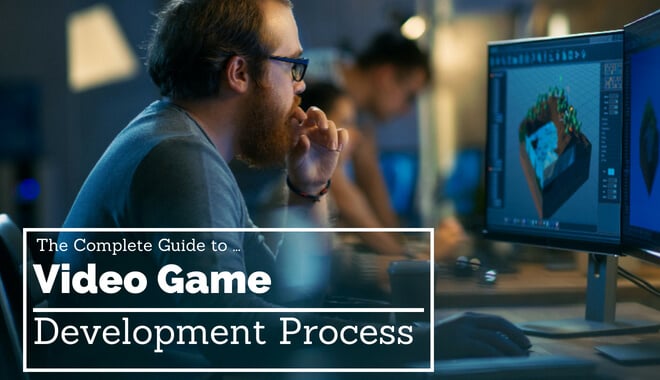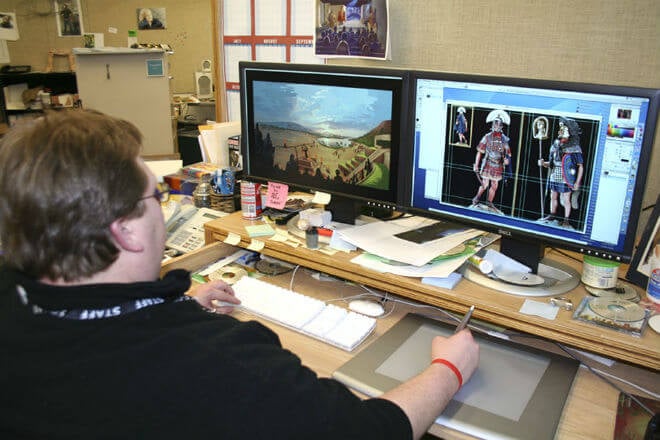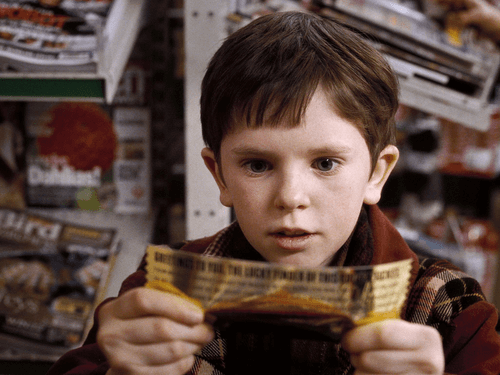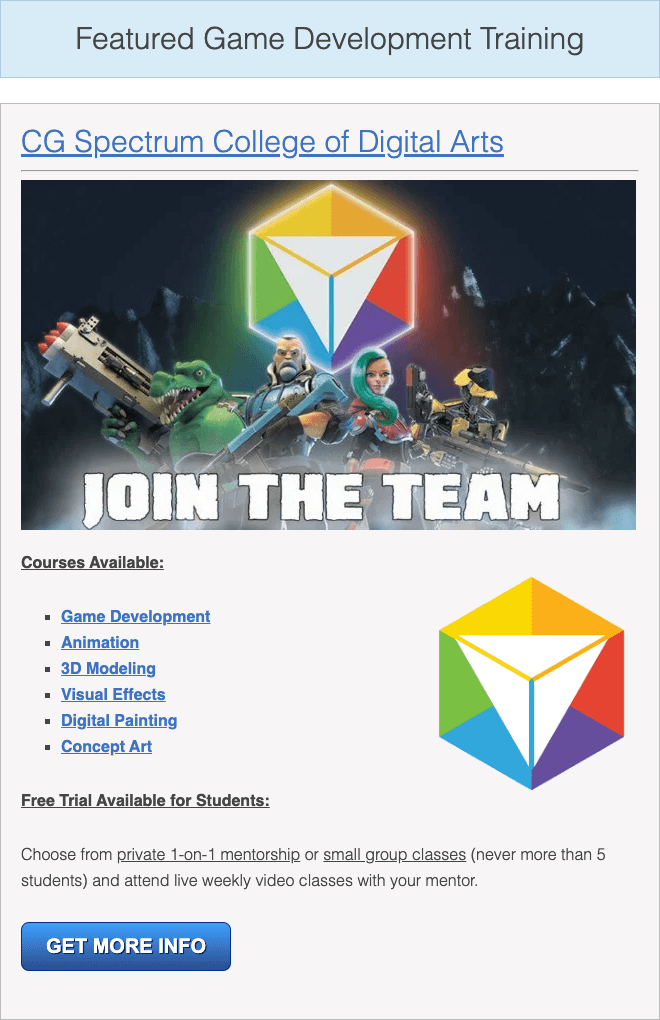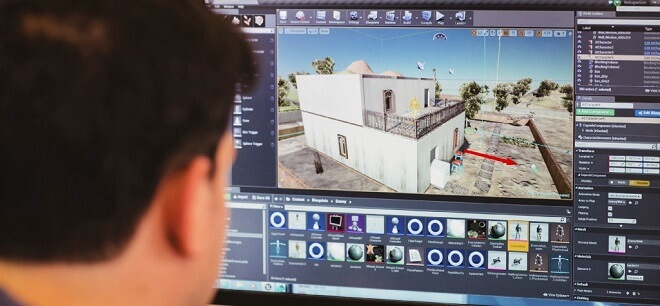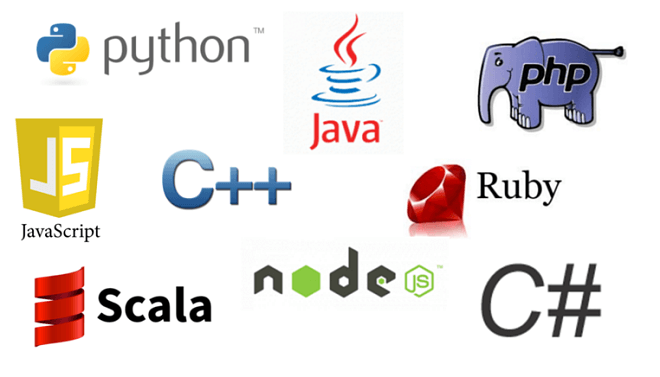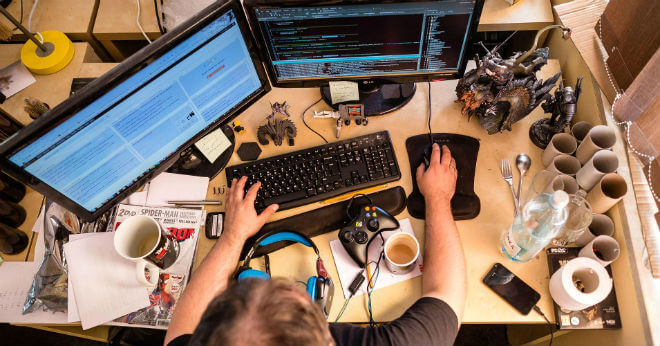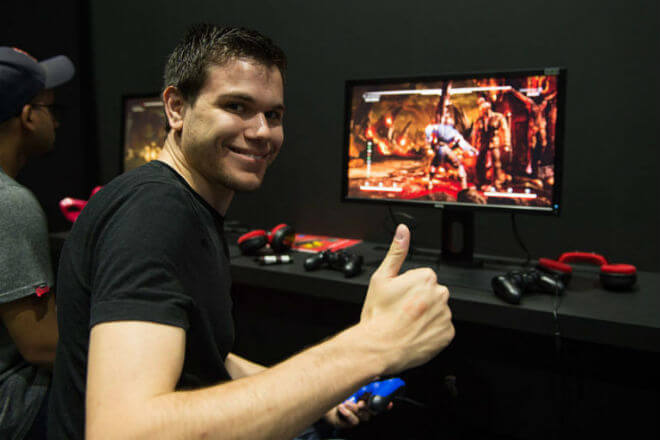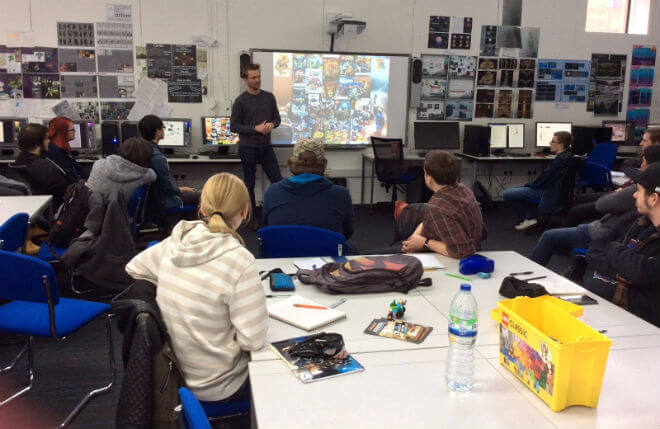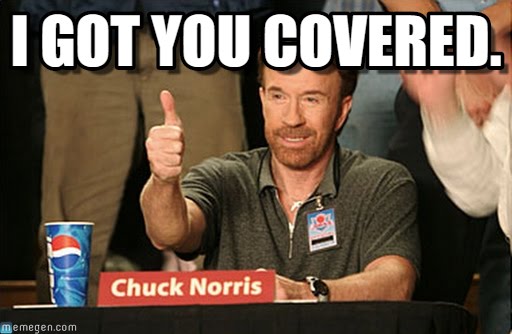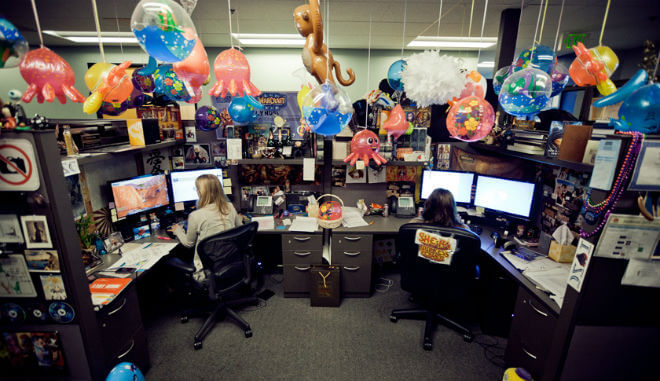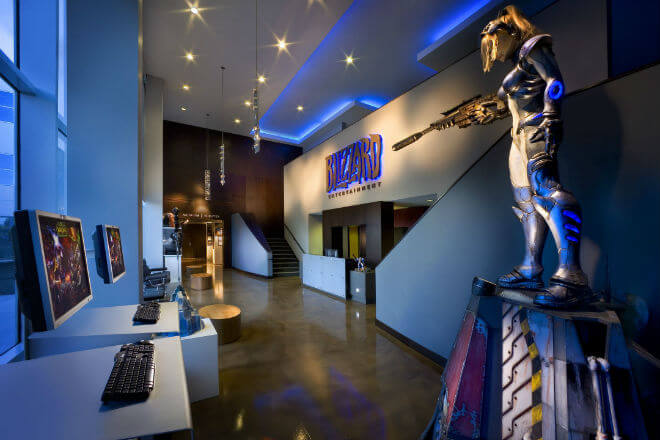|
You’ve played video games. Now learn all about video game development. What is Video Game Development?In its simplest form, video game development is the process of making a video game. In video game production, you take an idea or a concept for a game, and you develop, program, engineer, render, record, mix, produce, test, etc. until you have a full-fledged game.
That definition is a good place to start, but it’s far from the whole picture. More pieces of the picture: Growth of Video Game DevelopmentThe popularity of the video game development field is booming. It’s grown quite a bit in the past 10+ years. There are a number of reasons for this. One of the obvious ones is the continued growth of the gaming industry. As video games become more accessible and gain a bigger following, more people consider participating in what goes on behind the making of video games. Another reason is probably the internet. Everything is so accessible! Including tutorials, games, and articles talking about how fun it is to be into video game programming. Also, depending on your age, you might blame millennials for the “video game development” boom. (zing!) The popularity boom means more opportunities to learn, as college educators rush to satisfy the demand and hoard your gold (while you rake in dat debt). It also means more competition as you’re now in a pool of thousands of like-minded students hoping to nap the “golden ticket” that is a degree in game development. How to Get Into Game Development*Timeout* Here’s the truth–you don’t need to go to college to learn video game programming. There are other options. And just because you go to college doesn’t mean you’re getting the “golden ticket.” In fact, there’s only one place we’ve seen a golden ticket actually work, and it’s in Willy Wonka’s Chocolate Factory. (Technically…two places we’ve seen it work, since, you know…remakes.)
So, the good news is that you have more opportunities to learn game development, how you want and when you want, than ever before! Bad news: So does everyone else, and there are only so many video game development jobs out there. Solution: You need to put the time in. This guide will help you find the best way to make a game (take that golden ticket to the chocolate factory, baby!). You don’t need any formal education. You don’t need to rule out formal education. You don’t need to wait until you have an elusive entry-level job before start making video games. You can become a game developer right now by opening up YouTube and a game engine and building something simple. This guide will give you tips, tricks, tools, and the basic knowledge you need to get your snowball rolling in the right direction. But first, a showdown. Game Development. Game Design. There can be only one! (Or is there even a difference?)
It’s true that the game design process and the game development process are two different things. Sometimes you’ll see them used interchangeably. Here’s a reason why: On a small team, you’ll have people dipping their hands into the design and the development side. Game Development encompasses both game design and video game programming. That’s why sometimes game studios are called game developers. It’s kind of like the rectangle/square debate. So, this isn’t the hard and fast rule, but it’s a decent rule of thumb to work from: Game design deals with the conceptual side of things. Designers come up with the initial vision for a game. The mechanics, the core concepts, the aesthetics, the characters, levels, narratives–these elements tend to fall under the scope of game design. Game development involves bringing these ideas to life. The game development process takes games from the conceptual phase, through *development*, and into reality. A game developer can refer to a single person/occupation, or to describe a whole game studio. The stages of game development typically involve programming, coding, rendering, engineering, and testing of the game (and all of its elements: sound, levels, characters, and other assets, etc.). You (kind of) know the difference…but what kind of roles can you expect as a game developer? 6 Stages of Video Game Development
“I want to learn how to make a video game, where do I start” – I hear you crying out. Well, it starts from nothing, essentially. You need to make sure that you have a reliable team of artists, programmers, and more. Here are the following stages of game development, and the best ways of learning the stages of game development (step by step). Step 1: High ConceptThe first major step in how to develop a game is the high concept. This is a general idea. It’s a very brief description where you try to distill your ideas down to a few sentences Step 2: PitchThis is the big one. You pitch your idea in a summarized form to best communicate ideas and their goals. It’s also a time to promote why it would be a prudent idea to develop financially and commercially. Step 3: ConceptFurther along, this is the lovechild between the high concept and pitch. This is where you outline and describe all of the aspects of the game. We’re talking story, demographics, risk analysis and a boatload of further information. Step 4: Game Design DocumentThis document includes aspects tied to actual gameplay and may include prototypical aspects of your project. Step 5: PrototypeThis is where you and your team can shine early on the game development process. Building the prototype will allow you to develop the methods in which you’ll fully execute your idea. It’s a good way to build a proof of concept, adapting your goals into a more tangible form. Step 6: ProductionDesign Level Creation Programming This is when the ball starts to roll. Things like sound and early graphical assets begin to be implemented. The game is lifted off of the ground and finally starts to take shape. This is where programming comes into the video game development process. Programming Languages for Video Game Production
Programming is the language of game development. Game developers should learn how to make games using one of the several coding languages to better their product. But the real question here for some more rookie game developers is how to program video games. Game developers can learn video game programming using a multitude of different ways. But first, they need to find the language that fits their style and level of learning. What is the best programming language for game development? How does coding work in video games? Programming LanguagesThe most popular and most widespread used programming languages currently are: When it comes right down to it, these are merely the different avenues you can take when making video games. What Does a Game Developer Do?
There are a lot of elements that go into creating and developing a video game: Story Audio assets Characters Levels Gameplay mechanics The list goes on. But you can learn video game programming and be in charge of any of those elements. A lot of game developers are heavy on video game programming. They know how to code, and they do exactly that to bring the design concept to life. The rule of thumb for video game development is the smaller your team, the bigger your role. When making video games in an independent developer setting, you might have an opportunity to take on the responsibilities for the audio, the character assets, and the level design. How to Create a Video Game in an AAA StudioIn a AAA studio setting, you’d likely have a specific role within one of those categories. Maybe you’d be responsible for rendering enemies 1-5, or for developing a specific part of the in-game world. It’s not uncommon for developers to specialize in one or two specific areas. But again, the size of your team and the scope of the game development project will play an important part in determining the breadth of your role. In some cases, the role of designer and developer will blend. You could spend time brainstorming and concept character designs, and then take the final concepts and bring them to life in the game. Game Developers have an advantage over game designers from a supply standpoint. Studios are often looking for great programming talent. The “shortage” of good video game programming professionals makes them indispensable to development-hungry studios. Also, your concrete programming abilities are generally easier to quantify than an abstract skill like “creativity”, which is necessary for successful game designers. How to Develop a GameAs we’ve mentioned, your specific game development process will depend on your role within the team. You might work on a small part of the bigger project, or you could work on the whole thing. But, generally speaking, this is how the game development process unfolds: First, you start with a concept. In many cases, you’ll have what’s known as a game design document. This is your “bible” for the game. It’s the complete how-to manual for creating the game. It has all the details you need: Plot points Story details Character Biographies and aesthetics Level designs and objectives Game mechanics and core gameplay concepts Themes and aesthetics for the game The list goes on. Sometimes the game designers will put this doc together. Other times you’ll have a hand in creating it with them. Once the team is on the same page with the majority of the design decisions, it’s time for you and the other developers to shine. How This Affects the Game Development ProcessFor you, this could mean 3D modeling: characters, objects, vehicles, weapons, items, structures, etc. Everything you see in a game needs to be developed by someone! Maybe you’ll get to work on levels (an attainable entry job). The game design document will contain sketches, concepts, and aesthetic notes for the map. It will probably have notes on how the player is expected to interact with the level, the level’s relation to the characters and the world as a whole, and also the level’s role in the story. Establish a FoundationAll of these elements will factor into your game development process (yes, even with the design document, you still get to make decisions!). Maybe you’re working on tweaking the game mechanics. Maybe you’re making adjustments to address balancing issues. You could be deciding how fast the character should move. How big the enemy should be relative to other things in the world. How fast weapons should fire, or how accurate the projectiles should be. The level mechanics. The enemy spawns. Every element needs to be programmed into existence. Add Media AssetsNow, as the game continues to take shape, it will likely need audio! Is there a dialogue between the characters? The audio developers will be responsible for bringing voices into the game. The character developers will animate the facial movements to line up with that dialogue. The audio developers will work on the score, the ambient noises, the sound effects. Everything needs to be developed! And, as a developer, all these areas of game dev are your oyster. As the game finally comes together, it falls to developers, once again, to squash the bugs. We aren’t talking about a “spider in the house” sim…we’re talking about playtesting and quality control. While making a game, developers need to make sure the game works. Testing PhaseA lot of the time you can hire QA testers (or start as one yourself, you can be a game tester before jumping over to game dev!). There’s also software that automates parts of game testing for you (but it still needs some oversight from a game development maneger).
And, with any great project, there’s some change. The Game development process can be a nebulous one. Problems will crop up. So will bugs and glitches. So will impossible deadlines. If you’re flexible, adaptive, and know what you’re doing, you’ll be just fine! How Do You Learn Game Development?
Still with us? Like what you’re hearing? Time to learn how to…learn how to develop a game. There are some basic options: College programs Summer programs Certificate programs Online courses The YouTubes (Check out the best game designing Youtube channels) The Internet at large Old-fashioned books (Here’s a List of Game Design Books We Recommend) Trial and error The path you pursue will most likely be determined by several factors: Your financial resources (#sidehustle) Your time availability (full-time or nights and weekends?) Your current level of experience (on a scale of 1-10, how comfortable are you with… game developing) Your end goal (hobby or jobby?) Which Area of Game Development Interests You?This is an important question that you need to answer for the sake of your own sanity (probably) and for the sake of honing in on a couple of skills (definitely). There are benefits to having a well-rounded game design process and there are benefits to specializing. There are cons to both as well. If you’re looking forward to making a game as a professional, specializing will help you in the long run. It also limits the number of positions you’d excel in at an entry-level…but it makes you better at the jobs that do match your skills. Say a studio is looking for a 3D animator or an assistant character developer. If you specialize in 3D animation, and your portfolio shows 3D animation, and your resume talks about your 3D animation experience…they’re probably going to pick you over your peer who has a general “game developing” resume and portfolio and scattered development experience. But, a small team looking to hire a Jack-of-all-trades video game development type might go for someone who isn’t as specialized. Are you looking to get into AAA work? Or do you want to support the indie development scene? A good rule of thumb: Try everything once. See what you like. Stick with those skills! Your Current Level of Experience and End GoalIf you already have some video game programming experience, or you’re looking to make a transition, then certain programs will be a better fit than others. The good news is, you can find exactly what you’re looking for. Need a course that teaches the basics? No problem.
We’ll look at some of these options in just a bit. Limited Resources
There’s one more factor that will likely influence your decision, and it’s time. Or money. Or both. You might not want to drop 200,000 USD over the next four years to get a game development college degree (or, if you do, that’s fine too!). Maybe you need it for free. Maybe Mom and Dad offered to spend a few hundred bucks on a video game development course for you for your birthday. Or, if time is an issue, you can find flexible courses that will fit your schedule. There are options for all of these criteria. The point is, regardless of your situation, your resources, your time, your goals, your starting point–there are tools that can help you, and you can get access to them easily. College Programs
A degree in game development isn’t essential. But, if you do want to go for a degree in game development or video game design school, we have a number of resources detailing the best colleges for each. Go ahead and open those links in a new tab. Summer programs are offered by a number of colleges around the country–it’s worth a quick google search to see if local schools are offering one near you. These are great opportunities to dip a toe in to see if it’s something you actually want to do. It’s also a great way to make some friends who share your passion for game creation (teen indie studio, y’all!). Certificate game production programs meet halfway between summer programs and college programs. These courses usually last 1 to 2 years and net you a certificate denoting your new skills. This is another way to “test the waters” without committing to a full four-year program. Online Courses
Online platforms are some of our favorites to recommend. They’re inexpensive. They’re flexible. They have extensive rating systems (most of them do, anyway) so you can see what hundreds or thousands of other students thought before enrolling). They’re short. They’re not such a huge time commitment that you have to be afraid to try it. Three of the best online learning platforms are: Plural Sight Udemy Coursera Which Course Should You Choose?Video game production courses on these platforms offer a good mix of a go at your own pace and accountability (an important ingredient for success). The course loads are reasonable across the board. Most courses only ask for a few hours of your time each week. As with any skill or learning opportunity, you’re going to get out what you put in. Take your time shopping around for the right course. Udemy especially likes to offer discounts and sales. If you have your eye on a $100+ dollar course, see if they’re advertising any upcoming sales. You can often grab a video game development course like that (especially if it’s a year or two or three old) for something like the price of a large pizza (assuming a large pizza runs you about $15 bucks…). If you’re not trying to spend any money (because you just spent the last of it on a large pizza or you just live for those goose egg deals), YouTube and the Internet at large are your friends. YouTube and the Internet
You can learn how to do just about anything with YouTube. And that includes everything you want to know about game development and how to make a game from start to finish. Need to learn a new game engine? Want to learn a coding language? Want to take your skills to the next level? Want help designing your first RPG? Or FPS? Got stuck somewhere in your game development process? YouTube it. The platform has all the answers you need, and then some. Another great thing about YouTube: new content is uploaded all the time. Online platforms (and college programs) don’t necessarily stay up to date on the latest software as often as they should. This isn’t the case all the time, but tech moves quickly, courses get dated, and it’s hard and expensive to keep up. YouTube doesn’t have that problem. It just takes one person with the updated software and a knack for teaching to override last year’s dated material. The internet has made it easier than ever to pick up the skills you need to get started with game development. And, you know what else? It’s made it easier than ever to get your games in front of people, too! Maybe you don’t want to learn game development to create the next Superhot or Super Meat Boy on your own. Maybe you want to join a big dev team. For that, you’ll need a job. How to Get a Game Development Job
Before you start skimming this section we need to tell you the secret: Build a great game design portfolio. If you want a job in the video game development industry, your portfolio is the only thing that will get you hired. Some people will scare you and tell you that you need to have a degree otherwise you won’t even be considered! But they’re just trying to scare you because they had to go to college and they don’t want anyone to get in any other way. The truth is, if you have an incredible portfolio, it probably won’t matter what your resume looks like. Plenty of people have made it into the video game programming industry without a college degree. If they can do it…why not you? There are companies out there that hire 100% based on portfolios. They want to see what you can do, and your portfolio is your big opportunity to show them exactly that. If you’re applying with a bunch of other college grads, what’s going to help you stand out? What’s the differentiator? Is it your Treasury role on the high school student council? No. It’s your portfolio. Spend the time you need to on it! A little extra effort on your portfolio can go a long way in separating you from the 70% of applicants not spending enough time on their own portfolio. Meet People and Know People
Unless you already “know people” in the industry, you’re going to need to meet some before making a game. Go to gaming conventions. Go to meetups. Get involved in the mod community. If you meet someone, you have an instant leg up over a stranger looking for the same position. People like to hire who they know. They don’t even have to know you that well, they just have to recognize you and you get the “familiarity” advantage. And, if there’s one more tip, here, be easy to work with. Be likable. Everything about game development is team-based. It’s one big collaboration. You’re communicating all day with other team members. Being likable goes a long way. Best Game Dev Companies to Work For?
Instead of a list for you, we’re going to give you a different way of thinking about this question. The best game production companies for us to work for are going to be different than the best companies for you to work for. Try answering these questions, instead: Where do you live now, and where do you want to work? (there are game dev companies all over the world: USA, Canada, India, Denmark, France, etc. Do you want to work at a big company? (A number of them are in California) Do you want to work for an indie company? (These are everywhere, and they’re great opportunities for industry experience) What kind of games do you want to help develop? Not as satisfying as a list of the best places to work, but that’s really up to you. Find a company that matches you–don’t try to match a company! Every studio will have a different culture, different needs, different wants, and different ideas. Look for the ones that appeal the most to you! Game Development Facebook Groups Game Designers and CodersThe Game Designers and Coders Facebook group has over 9,500 members. When you’re looking for Facebook groups, it’s important to pay attention to how many people are in the group. Some game development for beginners groups have only 3 members. Others, like this one, have nearly 10,000 members. The amount of people in a group is not inherently a bad thing. If you’re looking for a lot of engagement, the more people there are, the more they’ll have to say (in many cases). This group continues to grow. They’ve added 173 members in the last 30 days. That means the group is still active. But that’s not the only indicator. In the last 30 days, this video game production group has had 160 posts. That’s a lot of posts! It’s possible your post could get lost in the sea. But it’s also possible that, if you’re asking good questions or posting good game development content, you could end up with 15-20+ comments on your post. This group is a closed group. That means that, in order to join, you’ll need to request permission from the group’s admins. This is typically a good sign. It means the group wants to control its growth and the quality of people they’re letting in. This typically means fewer bots or spam accounts, and any trolls that sneak through the cracks probably won’t last very. Game Designs & DevelopmentThe 2D & 3D Animations, Game Designs & Development group is a closed group with over 1700 members. They’re actively accepting members, adding about one per day over the last thirty days. The posting is manageable, with just 32 posts in the last 30 days. This game production group was created by Asset Games India. Asset Games is now 3D-properties-hub. The group has a link to their official site, where you can take a look at their 3D models (and potentially purchase them). Could be helpful for inspiration, but might not be your best bet for getting help or advice. Indie Games MarketingThe Indie Games Marketing group could be helpful if you’re thinking about how to get into game development and how marketing affects it. The group has 5,310 members, so it’s a decent size. People are actively joining, with 101 adds in the last 30 days. The group has some rules (and a strict banning policy for any rule breakers—which generally means better content from the group members). The first rule is: So, if you’re in the development phase, this group isn’t for you. But, if you’re looking for help from people with more knowledge or experience with game marketing, then this group could deliver. You’ll be dealing with some self-promotion from some group members, which don’t receive much attention. A scan through recent posts will show you that good content does get participation from other members. Respect people’s time and they’ll help you out! Independent Video Game Design and DevelopmentThe Independent Video Game Design and Development group is young, only about 8 months old. It’s small, too, with only about 420 members. Forty-one members joined in the last 30 days, and the group averages about one post per day. There are a few comments on these posts, but the questions and comments aren’t super helpful…yet. This is “a more relaxed video game production group with no rules as long as the content is related to video games in any way and does not offend anyone.” If you have good questions or advice to offer, it might be worth getting into this group early. Mobile Apps, Developers, and ProgrammersThe Mobile Apps & Games Designers Developers and Programmers group has 7,951 members—with nearly 1,000 added in the last 30 days. This group is extremely active, with 680 posts in the last month. Now, a lot of these posts end up being self-promotion for both games and tutorials. Some of it is spam, with businesses just joining to try and get people to like their professional page (the downside of open groups, though closed groups are not immune). There’s not a lot of engagement on these posts. But! There are also posts about job opportunities, links to helpful articles, and links to some projects that are actually cool. There’s some junk to sift through in this group, but there are definitely worthwhile contacts in there if you can root them out. Video Game – Composers & Sound DesignersThe Video Game – Composers & Sound Designers group “is a group for anyone who is connected to making sound or music for video games or wants to get into the field. Fans, as well as any field of game developers, are welcome.” This group has over 8,800 members, with 191 added in the past month. There have been 128 posts in the last 30 days. It’s been around for about 11 years. This group has good content and good engagement. Posts made in the last few days have received 20+ comments, and the discussions are valuable and interesting. Here’s a plus—they don’t tolerate any spam or ads. Indie Game DevelopersThe Indie Game Developers group is “for small companies and individuals designing and publishing their own games.” The group is enormous—over 96,000 members. Nearly 3000 members have been added in the last 30 days. The groups have been around for 10 years. There have been over 3,000 posts this past month—but these posts are still raking in the comments. The group admins policy against spam and promotion, and off-topic posts. Many of the members seem really helpful, and the content looks like quality stuff. There are interesting posts about all corners of the world, and neat updates from developers working on their own projects. Several posts are asking for advice, some technical, some not, and these posts all have at least a handful of responses. Motivational Game Development VideoWritten by Dustin Tyler [Updated September, 2023]
While not a professional game developer himself, he’s utilized his web dev skills and desire to help others by creating a resource where expert game designers can share what they’ve learned with the next generation of aspiring game makers. Meet the rest of the team. (责任编辑:) |

